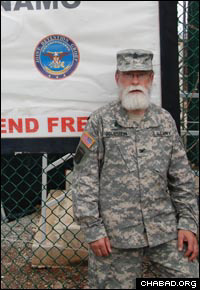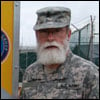Last month, Chabad-Lubavitch Rabbi Jacob Goldstein planted the seeds of a Jewish infrastructure in a location most people don't think of a home to Jews: the U.S. military installation at Guantanamo Bay, Cuba. The expectation, said the Army colonel and chaplain, is that Jewish life there will only expand.
The Army asked Goldstein to spend the Hebrew month of Tishrei at the base – which provides support to naval and Coast Guard operations in the Caribbean, houses the Joint Task Force-Guantanamo, which is the military's detention center for suspected terrorists – to do all he could in assisting the installation's Jewish personnel to provide Jewish services for the High Holidays.
"The military does a lot to support the needs of its soldiers," said Goldstein, who at the Army's behest has deployed and led services and counseled Jewish personnel in South Korea, Iraq, Afghanistan, and Bosnia. He was also the military's chief chaplain at Ground Zero, where he spent many months.
While at Gitmo, as the military refers to Guantanamo, the colonel assisted the Joint Task Force chaplain there to provide religious services for the Jewish High Holidays. But Goldstein, a native New Yorker and Chasid of the Lubavitcher Rebbe, Rabbi Menachem Mendel Schneerson, of righteous memory, didn't stop spreading Jewish pride anyway he could.
He took no time in helping Karen Einhorn, principal of the Defense Department's school at Gitmo, affix a mezuzah to the front door of her home. It was reportedly the first time a mezuzah graced a Guantanamo doorway. Using extra pairs of tefillin he also helped soldiers don the phylacteries.
Goldstein arrived before Rosh Hashanah and stayed through the duration of Sukkot, bringing a Torah with him from New York. He utilized every possible moment to teach about Judaism. While on a tour of the bay's pristine waters, he used fish caught from the sea to lecture chaplains and chaplain's assistants about the differences kosher and non-kosher species.
For Sukkot, he supervised the construction of a sukkah at the island base's hilltop chapel, which was lit at night with the help of some engineers from the Navy. During the holiday, the structure shone through the night, becoming in Goldsteins's words, a "beacon on the hill."
The 60-year-old Goldstein is the only member of the armed services who sports a full-length beard. He joined the New York Army National Guard in 1977 and credits the Rebbe, whose worldwide tefillin campaign began 10 years earlier, for his enlistment every being possible.

Although he was asked many times to sign up and join the military, one event in particular spurred him to action.
"You're doing such a good job," he remembered one chaplain telling him before asking who he reported to. "We need you in the army. I want to ask him to send you to us."
When the proposal was brought before the Rebbe, he wholeheartedly agreed. He then encouraged Goldstein to remain in the Army with a full-grown beard.
Citing military grooming policies, "the Army gave me 30 days to either leave or shave," said Goldstein.
He fought fiercely to keep his beard, but was constantly denied dispensations by military brass. Nearly at wit's end, he wrote to the Rebbe, who told him to stay. Soon after, he finally got the official exception allowing him to keep the beard.
Goldstein, who was recently awarded the Joint Forces Commendation Medal for his contributions to chaplaincy operations at Gitmo, stressed that his family has supported him every step of the way.
"I have a great family of Lubavitch Chasidim, who believe in the shlichus," said Goldstein, using the term – loosely translated as mission – that Chabad adherents use to refer to the task of spreading Judaism wherever Jews may be found.
Referring to the fact that he spent the High Holidays away from his family, he added: "You have emissaries that have a tough Rosh Hashanah and Yom Kippur. My mission's a little different."









Start a Discussion